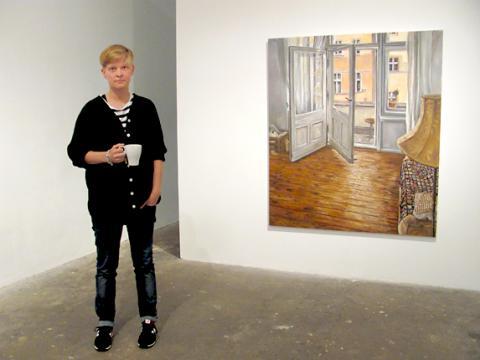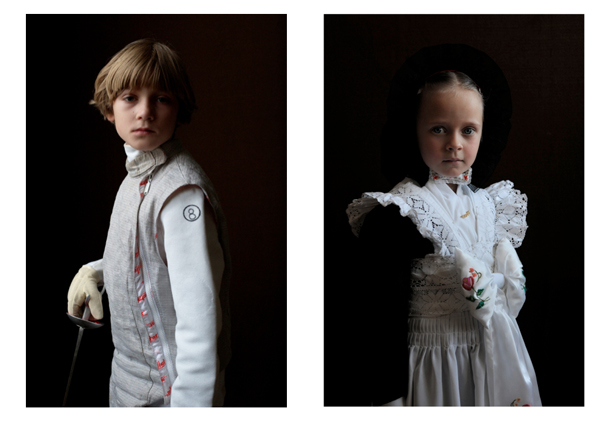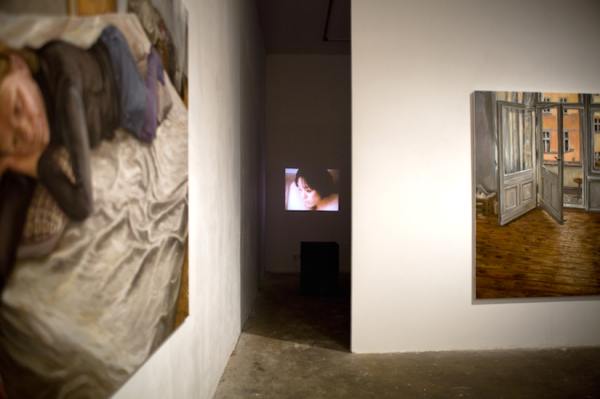Have you met... Suvi Lehtinen
Have you met... Suvi Lehtinen

Suvi with a painting from the exhibition Alte Schönhauser Strasse 26 by Eemil Karila
She landed in Berlin almost three years ago. Before starting the gallery under her name in Mitte, she would trace a long academic path from Finland via London and New York. Suvi first got her BA in Art History and then her Masters degree in Cultural Studies at Goldsmiths College before moving to New York, where she would spend four and a half years keeping herself occupied with another masters in International Relations and working at the Center for Humanities at the City University of New York.
She then co-founded Kuma Galerie in 2009, a project with a completely different program from what she is doing now, that served as a good training process for the gallery that she later on in 2010 would open in the same place in Novalisstrasße 7, this time under her only supervision.
Galerie Suvi Lehtinen presents itself as “ a collective enterprise that focuses on curatorial collaborations and exhibiting work by Berlin based as well as international artists”. The concept is a bit of a political idea in itself, in the sense that they can work as a collective enterprise, doing quite interesting curatorial projects and collaborations and still managing to make it in a commercial way. Conceptual and aesthetic values are to be equally found in this space. From the very first sight, it is obvious that Suvi does exhibit delicate things in a clean, accurate way that seems to be timeless, meanwhile there is a wider meaning and intention lying underneath.
On Friday they will be presenting Iwajla Klinke 's solo exhibition Crowns & Gladiolas, a series of photographic portraits that deal with society, ritualism and cultural practice in contemporary times, striking a whole debate around youth, tradition and symbolism in an almost eerie way.

What was the main concept before you started?
I liked the idea of having a very close relationship with the artists I work with. There is a close dialogue between me and them, a sort of a social and communal thing. That's why working with curators is also something usual here. They always bring new artists and ideas
What were your main goals?
I guess mostly to have this kind of inspiring experiences you can get from producing really great shows and working with people who, in my opinion, do a very interesting and important work. And obviously there is the challenge of running the gallery in a way in which it can still support itself. It's not making lots of money for me or anybody else, but at least it's possible to keep doing shows and the artists can continue working. So we combine two different concepts: we do half commercial shows as well as more conceptually based curatorial projects. The latter is probably not the best thing for selling, but that's not the main goal anyway
How do you finance yourself?
This project is mostly self-financed. I have occasionally received some grants for specific shows, for example from national funding bodies. If I put on a show of someone from Finland I receive project-specific grants for publicity material or production costs that is always very helpful. I'm trying to find more commercial bases as well, to have steady sales, at least enough to support what we are doing
How do you feel your concept developed within the time?
I think it came through experienece, by trial and error even, since I didn't have a pre-established idea.
When I set up my own space I had more time or I already had more of an idea of how it worked for me. It's been developing last year and it's still kind of coming together.
It's a very personal situation, and mostly depends on the people you have to work with
So what is your criteria to choose your artists
Maybe it has to do with the fact that we are in Berlin: there is so many people here working in the arts and you have access to so much art, that it tends to happen that I mostly meet artists. It's been a few times that I've been to open studios and found out good things, but usually I meet people through other artists or when curators are coming in, then introducing me to artists based in Berlin.
I don't think there's any particular criteria, but there's something in the work that I find interesting. It must have a conceptual base while they are also interesting in the aesthetic department. There is a lot of work that I show with a social or political element. I'm interested in the possibilities for art to have this kind of political role. I'm drawn to things like that, but that's not necessarily the criteria. It's more interesting when this thing it's sub-content instead of a label
What did you learned from your practice?
Runing your own business it's really challenging, there's a lot of things to learn from it. I have some responsibility with the artists, to give them the best when exhibiting their works. Things might become a bit routine when you do them so often, but you can't loose your interest or concentration. So you have to share the passion with the artists.
I also learned a lot about contemporary art by seeing things that people are currently working in: interesting art conversations going on right now and things that are specially happening in Berlin. That's been very fullfilling

Eemil Karila's exhibition view. Picture courtesy of Ilkka Saastamoinen
Do you have any favourite curator?
I like the curators I've been working with. There's a lot of young ones from Berlin. It’s great for them here because they are continuously exposed to what it's going on. I worked with Elly Clarke, who used to run a gallery here in Berlin but is now based in Birmingham. Next year Vappu Jalonen, a Berlin-based Finnish curator, is doing a show for the gallery
Your favourite art spaces or institutions in Berlin?
For institutions, Hamburger Bahnhof hosts very interesting shows. Also Grimmuseum, and Neu, of course. I really like what they show and how they do it: questioning the position of art within the art, something very conceptual
In the world?
Moderna Museet in Stockholm and PS1 in New York. They have amazing shows. I really like what both are doing and I think that institutions play a very important social role. Public museums and galleries are often wrongly criticized for being too institutional , but they are there to reach many people. They have the responsibility of being self-critical about what they do and how accessible they are for visitors
Where will be Suvi Lehtinen in five years?
In 5 years I would have been here for 8 years, the same time I was in London. I like city hopping, and my dream is to open a second space in another city. Maybe I will need to find a partner in order to do that but that is not out of question.
So hopefully I'll be here and somewhere else. I thought about Stockholm, London, New York... places where I already have connections and know the scene.